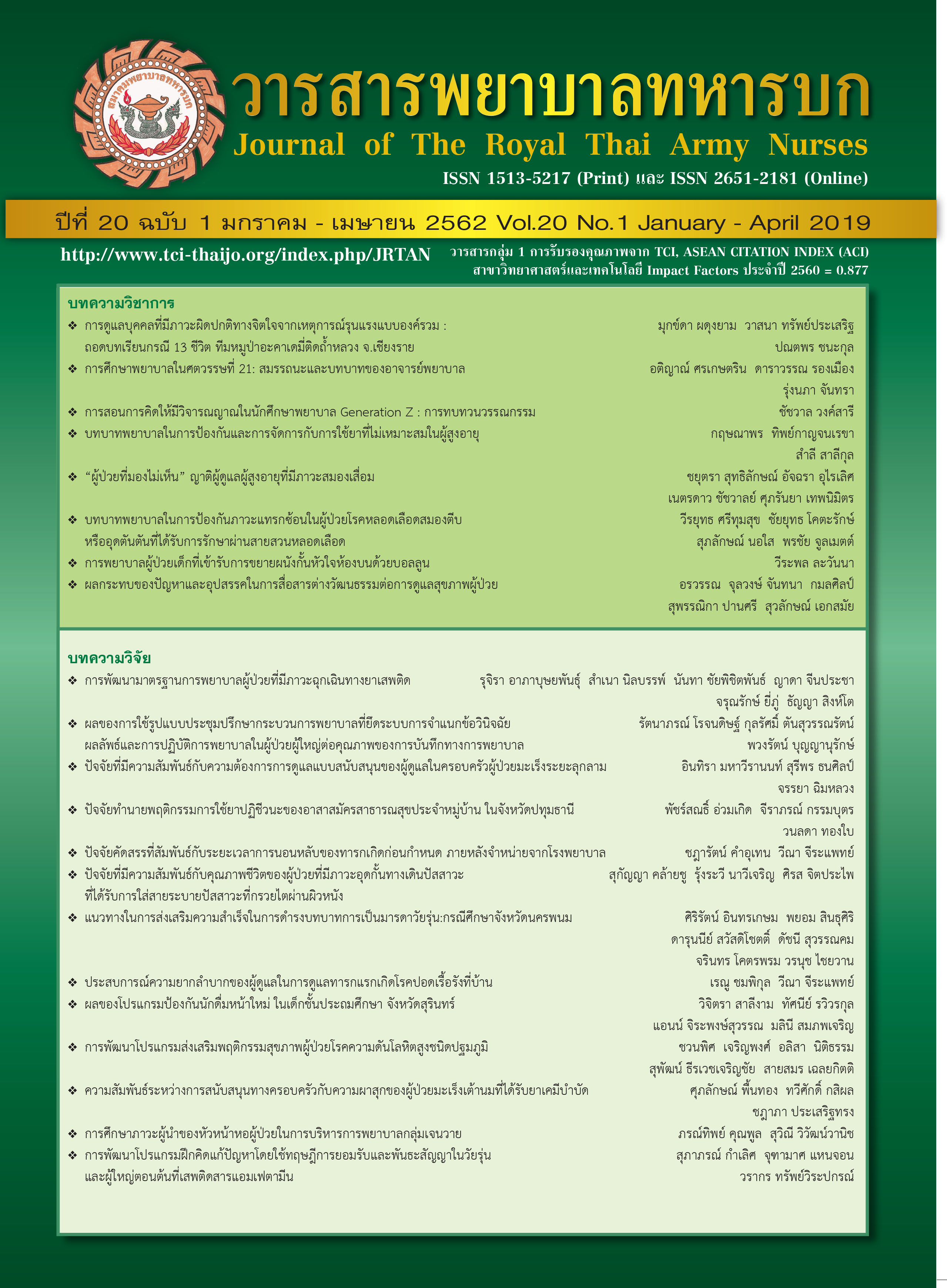The effect of Palliative Care to Quality of Life of People who Living with End Stage Renal Disease in Community
Keywords:
Palliative care in community, quality of life, End stage renal disease patientsAbstract
This research was quasi experimental study. The purposes were to study the result of palliative care to quality of life of people who living with end stage renal disease in community. The samples were selected by purposive sample with inclusion criteria. 35 end stage renal disease patients in 1 group pretest and posttest in palliative care. The instruments were composed of 1) General information and symptom 2) QoL questionnaire of Ferrans and Powers Dialysis version-III with content validity = 0.65, reliability with Cronbach’s alpha coefficient = 0.843. 3) Evaluation form of palliative care 4) Meditation healing exercise of SKT. The steps in palliative care composed of following 1) making relationship, 2) making understanding 3) making mindfulness 4) making acceptance and bereavement care. Descriptive statistics analysis and inferential statistics analysis for hypothesis testing by using readiness program. Pairt-Test in pretest and posttest of quality of life in palliative care. The result found that 71.4% was woman, 57.14% was the average age at 70 years old, 77.1% was primary level of education, 57.1% of patients had social welfare with gold card care. The symptom of the end stage renal disease patient before and after found that itching had significant difference (p-value at .048). Comparison before and after palliative care had quality of life in health & functioning, psychological & spiritual, and family significant difference (p value <.05). There was no significant difference of Social & Economic quality of life. Conclusion, palliative care for people who living with end stage renal disease in community composed of the steps of making Relationship, Understanding, Mindfulness, Acceptance that were supported in working within understanding the context of community and led to develop quality of life in their envelopment.
Downloads
References
Domrongkitchaiporn S, Sritara P, Kitiyakara C, Stitchantrakul W, Krittaphol V, Lolekha P, et al. Risk factors for development of decreased kidney function in a southeast Asian population: a 12-year cohort study. Journal Am Soc Nephrol. 2005; 16: 791-99.
Bunyatnopparat K & Anutrakulchai S. Factors Associated with Life Quality of Hemodialysis Patients Dong Luang hospital, Mukdahan, Thailand. Srinagarind Medical Journa. 2017; 32 (1) :2-9. (in Thai).
Sanhome W. Quality of life of people who living with end stage renal disease and on Hemodialysis at hemodialysis Unit, Khon Kaen Hospital. Khon Kaen Medical Journal. 2008; 32 (1): 1-15. (in Thai).
Ukati K, Chantajirakhovit N. Self-care agency and quality of life in end stage renal disease patients undergoing continuous ambulatory peritoneal dialysis. Songklanagarind Medical Journal. 2007; 25 (3) :171-77. (in Thai).
Anand S, Khanam MA, Finkelstein FO. Global perspective of kidney disease. In: Byham LD, Burrowes JD, Chertow GM, eds. Nutrition in Kidney Disease. (2nd ed.) New York : Springer Science & Business Media. 2014 ; 11-33.
Setboonsrang K, Prasomrak P. The care model development for end stage renal disease patient who had renal replacement therapy on self-care and quality of life in Loengnokthacrown prince hospital ,Yasothon province. Community health development quarterly Khon Kaen university. 2016; 4 (4): 485-503. (in Thai).
Bunyatnopparat K, Anutrakulchai S. Factors associated with life quality of hemodialysis patients. Sirnagarind nedical journal. 2017; 32 (1) :1-9.
Danquah FV, Wasserman J, Meininger J, & Bergstrom N. Quality of life measures for patients on hemodialysis: a review of psychometric properties. Nephron Nursing Journal. 2010; 37 (3): 255-69.
Ferrans C, & Powers M. Quality of life index: development and psychometric properties. Advances in Nursing Science. 1998 ; 8: 15-24.
Triamchaisri S.K. (Ed.). Mindfulness meditation SKT technique. (Right). (7th ed.), Bangkok : Samjarean Press. 2008. (in Thai).
Triamchaisri SK, Mawn BE & Artsanthia J. Development of a Home-Based Palliative Care Model for People Living With End-Stage Renal Disease; Journal of Hospice & Palliative Nursing. 2013; 15 (4) : E1–E11. Doi: 10.1097/NJH.0b013e31828defe3.
Artsanthia J. Palliative Care in community with the Buddhism traditions. Journal of the Royal Thai Army Nurses. 2013; 14 (1) :123-27. (in Thai).
Wareesaengthip J. The improvement of the quality of life of the end stage renal disease patients by Dhamma practice. Bangkok. Renal association Thailand. 2010; 336. (in Thai).
Ingsathit A, Thakkinstian A, Chaiprasert A, Sangthawan P, Gojaseni P, Kiattisunthorn K, et al. Thai-SEEK Group prevalence and risk factor of chronic kidney disease in the Thai adult population. Nephrol Dial Transplant. 2010; 25: 1567- 75.
Anees M, Hameed F, Mumtaz A, Ibrahim M, & Saeed Khan MN. Dialysis-related factors affecting quality of life in patients on hemodialysis. Iranian Journal Kidney Disease. 2011; 5(1): 9-14.
Cruz MC .Quality of life in patients with chronic kidney disease. CLINICS.2011;66(6):991-95.
Artsanthia J & Swarjana, I.K. Primary Palliative Care Service in Thailand and Bali, Indonesia. Journal of the Royal Thai Army Nurses. 2014; 15 (2) :1-9. (in Thai).
Avramovic M, Stefanovic V. Health-Related Quality of Life in Different Stages of Renal Failure. Artificial Organs. 2012; 36: 581-89.
Artsanthia, J., Mawn, B.E. Chaiphibalsaridi, P. Nityasuddhi, D., & Triumchaisri, S. Exploring the palliative care needs of people living in Thailand with end stage renal Disease. Journal of Hospice and Palliative Care Nursing. 2011; 13 (6): 403-10.
Downloads
Published
How to Cite
Issue
Section
License
บทความหรือข้อคิดเห็นใดใดที่ปรากฏในวารสารพยาบาลทหารบกเป็นวรรณกรรมของผู้เขียน ซึ่งบรรณาธิการหรือสมาคมพยาบาลทหารบก ไม่จำเป็นต้องเห็นด้วย
บทความที่ได้รับการตีพิมพ์เป็นลิขสิทธิ์ของวารสารพยาบาลทหารบก
The ideas and opinions expressed in the Journal of The Royal Thai Army Nurses are those of the authors and not necessarily those
of the editor or Royal Thai Army Nurses Association.






